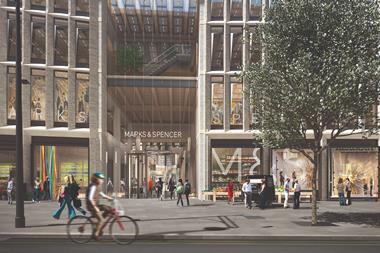It is widely accepted that we have reached a late stage of the property cycle. Some even argue that a downturn has already set in. However, our view is that while values feel pretty full, we certainly aren’t in bubble territory. It is reassuring to note that UK commercial property values have increased half as much as they did during the last cycle and the industry as a whole is nothing like as highly geared as it was in the run-up to the financial crisis a decade ago.


However, as lenders and investors, we can’t afford to be complacent. We remain alert to the risks of lending late in the cycle which today are as much, if not more, of a concern as structural changes in the market. Against this background, we have still been able to find value and we have invested more than £800m over the past 12 months, including our largest transactions to date in both our senior debt and partnership capital strategies, while we have been able to back some very interesting residential development opportunities in London and the South East.
The most obvious risk in today’s market is posed by changes to shopping habits. The inexorable rise of online shopping has already started to bite hard into the retail property market and undoubtedly, values and rents will continue to come under more pressure. We have therefore been reducing our exposure against retail property for some time but we are not turning our backs on the market completely.
”As lenders and investors, we can’t afford to be complacent. We remain alert to late-cycle risks”
While there is clearly trouble ahead for department stores and the centres they anchor, many retail centres will continue to attract shoppers, particularly those in densely populated areas that are focused on convenience shopping. We’ll continue to back borrowers and partners with deep retail experience in this part of the market.
The industrial market presents very different challenges for us. The rise of ecommerce is driving growing occupier demand but this means competition between investors to buy assets and between lenders to fund them is high. We have been active in the industrial market for many years but, with investment yields contracting to record levels, we see better relative value in development than investment and have funded two speculative warehouse schemes in the South East in recent months. Having said that, one of our biggest loans this year, and the largest loan to date in the senior debt programme, was the £125m refinance of an industrial portfolio, predominantly located in the West Midlands.
‘Live-work-play’ situation
The office market is also going through a period of rapid change with TMT tenants driving demand in many parts of the country, not just London, which are often followed by co-working operators, with most looking for that millennial-friendly ‘live-work-play’ situation. We are keen to support borrowers targeting this market, as evidenced by our loan earlier this year to support FORE Partnership’s £51m acquisition of Tower Bridge Court on the South Bank. It was our first office deal in London since 2015 and we are on the lookout for others as pricing for value-add investments in the capital is looking increasingly attractive.

We also continue to target the other major UK cities, confident that despite the uncertainty around Brexit, there are good lending opportunities available. The fundamentals of the office market in large UK cities remain healthy. Demand for space is robust; this has been driven by strong employment growth; supply remains tight due to a lack of new development and a similar lack of conversion of secondary office space to residential under development law.
Alternatives also look more attractive than ever. In an environment where Brexit brings an uncertain economic outlook, it clearly makes sense to be lending and investing in sectors where demand isn’t tied to the economic cycle. One such example is data centres; demand for data is set to grow exponentially but there are a very limited number of locations that can meet data centres’ specific requirements for connectivity or power. As well as backing student accommodation and hotels, which have been our alternatives bread and butter since 2011, we have been providing finance for data centres as well as a number of other non-traditional assets this year.
Indeed, we made our biggest-ever loan across the business this year in the alternatives sector – a £200m whole loan to Royale, an operator of permanent park homes aimed at the over-50s. The loan was backed by 27 individual parks and 3,500 plots, providing a good level of granularity. We also like the fact that the number of over-50s is set to grow at twice the rate of the whole population.
This year, ICG-Longbow expanded its direct investment activities with the launch of our build-to-rent business, through the Wise Living joint venture with SDL Group, and a pan-European sale-and-leaseback strategy. Growing both will be a key focus for us in 2019. Increasing demand for private rented housing gives us confidence in the outlook for build-to-rent, particularly as our focus is on family housing, which is an undersupplied part of the market. The sale-and-leaseback business is also an exciting venture for us that brings together ICG-Longbow’s property expertise with ICG Group’s 29-year track record of investing in European corporate credit deals.
We also plan to expand our partnership capital lending and investing activity into continental Europe in due course. For us, it’s a natural progression for the business and doesn’t mean we’re any less interested in the UK. Although the UK market faces challenges, not least Brexit, we are still firm believers that there are plenty of good opportunities out there.
Healthy sign for the market
Looking at the supply of capital to the market, we see that banks remain cautious and have lowered their LTVs. However, we see this as a healthy sign for the market as a whole and they at least remain active. From our perspective, the fact they have pulled back somewhat is helpful for obvious reasons. When it comes to our senior lending, we used to compete with the banks mainly on our flexibility and speed, whereas now there is usually substantial clear water between our terms and the banks on leverage, while in the higher LTV whole loan market there are only a handful of lenders equipped to underwrite more complex property strategies, including value-add and development.
Finally, in the residential construction market, we have seen more activity from other non-bank lenders, but in our opinion this has been more than offset by a couple of UK banks pulling back from the market, while the volume of debt capital available still remains low relative to financing requirements.
With positive occupational fundamentals in all but retail, we look ahead to 2019 with confidence that there will be plenty of attractive lending opportunities, despite (or even potentially resulting from) the ongoing political uncertainty. Having raised nearly £900m across our senior debt, partnership capital and residential development strategies this year and with fundraising efforts still ongoing, we have plenty of firepower coming into the new year and we look forward to continuing to support our customers with our flexible capital and partnership approach going forward.
About ICG Longbow
- ICG-Longbow is the trading name for the real estate business of Intermediate Capital Group, the FTSE 250 listed asset manager with €33.6bn AUM*
- ICG-Longbow was formed in 2006 by current business co-heads Kevin Cooper and Martin Wheeler
- ICG-Longbow AUM £3.6bn*
- £2.9bn invested across 114 transactions*
- £803m invested in 2018 across 22 investments
- £885m capital raised in 2018 across senior debt, partnership capital and development strategies
*As at 30.09.18

PW Perspectives: new opportunities and risks in evolving market
- 1
 Currently reading
Currently readingNew opportunities and risks in evolving market
- 2
- 3
- 4
- 5
- 6



































No comments yet